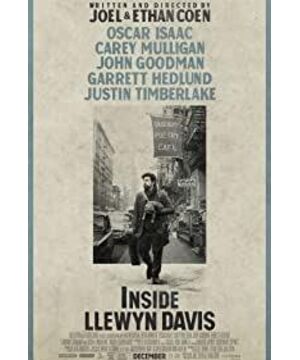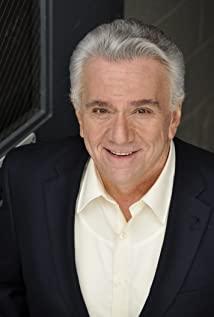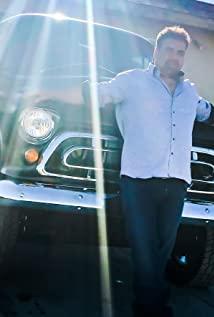Until yesterday, because of the cooling and freezing, I was always skipping inattentively when I walked, and I slipped when I went out. I remember that it was rainy in December last year and the road was slippery, and I fell on the tiled floor in front of my house on the spot when I went out. The scene is so similar, it makes me feel as if I haven't taken care of myself at all after a year. Suddenly realized that the similar scenes at the beginning and the end of the movie are not the epitome of Llewyn Davis's stagnant career and life.
I didn't figure out who Llewyn Davis was before watching the movie. Because it was an early stage, I went to a lot of staff and local film critics. According to the staff, the prototype of Llewyn Davis is called Dave Van Ronk. He was an important figure in the revival of acoustic folk songs in the 1960s in the United States. His active period was not widely recognized, but he inspired and helped a group of folk singers of the same period. Including the famous Bob Dylan and Joni Mitchell. This sounds familiar, but it is also a story of an unwilling artist. When this subject matter is in the hands of most directors (especially those who mix Hollywood), it will more or less be contaminated with a sense of idealism being trampled on by fate. , Such as Searching for Suger Man, which was popular last year, and Anvil! The Story of Anvil.
However, this is a movie by the Coen brothers. Although it does not have the cult complex that Fargo has made them famous, it is still calm and restrained. I can even imagine the two of them laughing behind the camera, as if there is no emotion or sympathy. Just watch everything triggered by the protagonist, and tell you that this is life.
Llewyn Davis is a poor folk singer who travels to friends' houses, tearing his face for money in a sweater and his former partner; he is inherently unpleasant, can make the atmosphere of friendly friends gathering rigid, and can make virtuous friends' wives. He becomes a bitch in one second; he is talented, but he does not have the qualifications to be famous. Other folk artists have a good family trio, a good friend trio, and a healing aunt. The performance is so warm and touching, and he is alone. He sang a heartbreaking song with a guitar, and he was about to sing himself crying. When he was in the Chicago test field, it was only in exchange for the boss to say "I didn't hear any business opportunities."
Davis' temperament may have limited his career development to a large extent, but it is that people like him can insist on his bleak solo singing when the warm combination is popular. If it were not for the sub-axis strength, he would have given up long ago. There will be no later words that inspired Bob Dylan. But the Coen brothers really don’t have any meaning to praise Davis. He behaves as a jerk most of the time; you can’t tell whether he is not talented or lacking in talent, nor how determined his goal is. He came back from Chicago. , With a manic expression on his face, he said that he had had enough and quit, and then returned to the bar to sing in a blink of an eye. He just didn't seem to think about what to do. But thinking of where to go is considered a choice, isn't it? Davis's life, at the end of the film because of this choice, fell into the cycle of "performance-closing-beating".
But saying that Inside Llewyn Davis is a cold movie, it seems to have failed the Coen brothers. They did not have a conscience so widespread that they turned the movie into an inspirational blockbuster like a talent show, but they still gave the protagonist an unnoticeable Cohen-like care. For example, the cat named Ulysses who lost and went home, such as the sleepy little jersey that I met on the return trip from Chicago, or hated him and couldn't help but care about his friends. , It's like a bunch of sparks in Xueye, it's still cold with it, but without it, you can't even see the road.
This film, like other Cohen films, is full of intriguing details. One of them was that when Davis was driving at night, he suddenly saw a cat in front of him. He braked hard and was not sure if he hit it. When I got out of the car to look, I found some blood stains on the car. So he tried to find the cat's body again, and found the cat limping into the forest. At that moment, his expression was unclear whether he was pleased, sorry, or sad.
This lame cat, isn't it just like Llewyn Davis himself, the road ahead is dark, walking alone, every step is difficult and painful. More importantly, you don't even know why he has to move forward after being so scarred.
But that's how he went forward.
View more about Inside Llewyn Davis reviews











